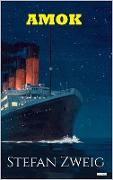Stefan Zweig was born in Vienna, Austria, on November 28, 1881, the son of Moritz Zweig and Ida Brettauer. Born into a wealthy Jewish family, he showed talent for literature from an early age, publishing his first book, a collection of poetry, at the age of 20. He studied at the University of Vienna, where he presented his doctoral dissertation on the philosophy of Hippolyte Taine in 1904. That same year, he published his first biography, that of the French writer Paul Verlaine. In 1906, he wrote his first play.
During World War I (1914-1918), already living with his first wife, Frederike Maria, he volunteered for the Yellow and Black Cross, a philanthropic organization of the Vienna municipality. He was then called up to serve in the Austrian army's War Archives, where, along with other writers such as Rainer Maria Rilke, he produced newspapers for the soldiers. During the conflict, he wrote the pacifist text "Jeremias," which was a great success. In late 1917, he traveled to Switzerland, where he remained until the end of the war. Upon returning to Austria, he settled in Salzburg in 1919. He lived in the city until 1934, during which time he wrote his most well-known works. In the 1920s, his books began to be adapted into films. Pressured by the Nazis due to his Jewish background, he left Austria in 1935 and emigrated to England, where he resided until 1941. During this period, in August 1936, he made his first trip to Brazil, where he was received as a celebrity. In 1938, with the Anschluss-the annexation of Austria by Germany-Zweig, like other Jews in the country, lost Austrian nationality; as a stateless person, he began to seek British citizenship. In mid-1938, while awaiting a response from the British authorities, he applied for Brazilian citizenship.
After the start of World War II (September 1939), he decided to leave England and, accompanied by his second wife, Charlotte Elizabeth Zweig, departed for the United States in June 1940 and then to Brazil. Stefan Zweig passed away on February 23, 1942.


